How is your team doing? No really...how are they doing?
Do you know? Do they know what you think?
Now is the exact time to reflect on that question, because Q4 is just 2 weeks away, and that means you are likely writing performance reviews in the not too distant future.
And if you want to burn credibility and trust with your team, one of the best ways is to surprise them with a mediocre or poor review for things you never really discussed with them before the review. Doing so robs them of opportunities for promotions, bonuses, raises, and most importantly fixing any issues quickly instead of much later.
Don't be that leader.
Talk with your team about issues and key feedback as it comes up, not just at review time.
In today’s edition, we cover more ways you can burn trust with your team, look at data that shows where managers may be overestimating our abilities, and have a few great things coming from Lighthouse you'll want to be on the lookout for.
Let’s dive in…
Table of contents:
- 🥘 Food for Thought on Killing Trust as a Leader
- 📰 News & Reports for Managers on Where You're Overconfident
- 🤫 A Secret to Help You comes from the next Lighthouse Lessons program to help you grow...
- 🗳️ Help us Create the Lighthouse Leadership Community
- ❓ Poll of the Week on Coaching Habits and Your Challenges
➡️ Did a friend forward this to you? Get every issue straight to your inbox by signing up here.
Note: This is a preview of our weekly leadership newsletter, Lighthouse Leadership Weekly (LLW).
To get this sent to your inbox every week, along with our latest long form essays on this blog, you can sign up here.

🥘 Food for Thought
"7 ways to kill trust as a leader (and how to avoid them)
1) Follow-through Fail: overpromising/underdelivering
2) Talk, but No Walk: do as I say, not as I do
3) Flip-flopper: their desires change as often as socks
4) Gossipmonger: they confide something negative about someone else to build bonds with you.
5) Ostrich Head: only wants to discuss the good; never the bad.
6) Ruinous Empathizer: doesn't say things they think you might not want to hear
7) Us vs.Them: puts their own team above other teams"
- Julie Zhuo, former Design VP at Facebook, now founder of Sundial.
I came across this Tweet and knew it was a good one for us to talk about and reflect on:
7 ways to kill trust as a leader (and how to avoid them)
— Julie Zhuo (@joulee) August 26, 2024
1) Follow-through Fail: overpromising/underdelivering
"You're on track for a promo!" (but it doesn't happen)
"Let's talk your career goals next time" but the next chat is about some immediate task
Antidote: Apologize…
The important thing about all of the issues on that list is that they're significant enough that even if you only do one of them, you can sink the culture of your team and sabotage your own otherwise positive efforts.
As the entertainer Will Rogers once said, “It takes a lifetime to build a good reputation, but you can lose it in a minute."
It really is that serious.
Great leadership takes effort.
Let's look at that list again:
1) Follow-through Fail: overpromising/underdelivering
2) Talk, but No Walk: do as I say, not as I do
3) Flip-flopper: their desires change as often as socks
4) Gossipmonger: they confide something negative about someone else to build bonds with you.
5) Ostrich Head: only wants to discuss the good; never the bad.
6) Ruinous Empathizer: doesn't say things they think you might not want to hear
7) Us vs.Them: puts their own team above other teams"
We've talked a lot about many of these issues before. Hypocrisy, failing to keep your promises, and toxic positivity all can hurt your team. And Julie has some great solutions in her lengthy tweet as well (you can read them all here).
What I want to talk about today is a few more additions for you to look out for, so you don't lose a lifetime's credibility with your team.
More ways to kill trust as a leader
Here are a few more ways you can kill trust with your team when you're otherwise doing a good job as a manager:
- Performance Review Surprises: We talked about it in the opening, and it bears repeating. Surprising your team member with negative feedback when their compensation and advancement are on the line is a great way to frustrate your team members deeply. They will not soon forget it.
- Carelessness/Forgetfulness of What Matters: If your team member tells you something really important, like time off for something very important, an accommodation they need for something deeply personal, or otherwise makes a request or statement that they really seem to care about, then being sloppy by not noting it, or forgetting about it will crush your team member and sour your relationship. If in doubt, write it down.
- Credit Stealing/Blame Shifting: Whether you steal the spotlight from your team, or you pass blame onto them for problems or failures, you'll frustrate your team by doing it. Be like the best quarterbacks in an American football game: the losses are your fault/you could have done more, while wins are all credit to your teammates who stepped up all around you. As we wrote recently, especially taking responsibility for losses makes it safer for everyone else to also take some responsibility.
No one said being a leader was easy. Stepping into any of these 10 areas can really hurt your relationship, which is why it's worth reflecting on if you've been guilty of any of these lately.
If you are, now is the time to reflect and think about how you can atone for them.
Admitting your mistakes is the first step. Then, the most important thing is to demonstrate with your actions that you've truly changed. That's what your team will be looking for to truly rebuild trust.
📰 News & Reports for Managers
📌 Gallup reminds us of the blind spots managers have...
I was looking over some Gallup data from earlier this year and was really struck by this chart:
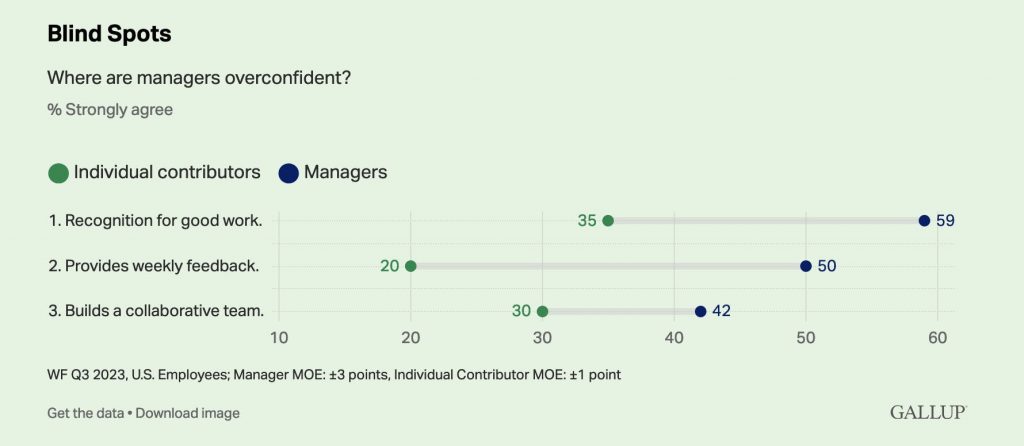
Look at those gaps!
What this tells us is that as managers we think we're doing a lot better than our team does. As Gallup wrote:
"Nearly 60% of managers feel they are doing a good job recognizing their team’s hard work and contributions, but only about a third of individual contributors (35%) share the same sentiment. Recognition isn’t happening as often as managers think, or it’s not being delivered in a memorable way for employees."
So knowing that managers are overconfident by about 2x across such key behaviors, let's make sure you're tuning up those skills.
Here are a few ways you can work on each of them:

1) Recognition for Good Work
Despite there being *a lot* of confidence from managers in Gallup's poll (60% strongly agree!), it seems team members don't agree. Remember that giving praise on a weekly basis had a major impact:
"[Those answering "strongly agree to] "In the last seven days, I have received recognition or praise for doing good work” is responsible for a 10% to 20% difference in revenue and productivity.
Employees who report that they're not adequately recognized at work are three times more likely to say they'll quit in the next year.”
If you need to work on giving that frequent of praise, so you water your proverbial flowers, we have you covered:
- Learn 9 ways (with examples!) how to praise your team here.
- And find 21 ways to be more positive and praising at work here.
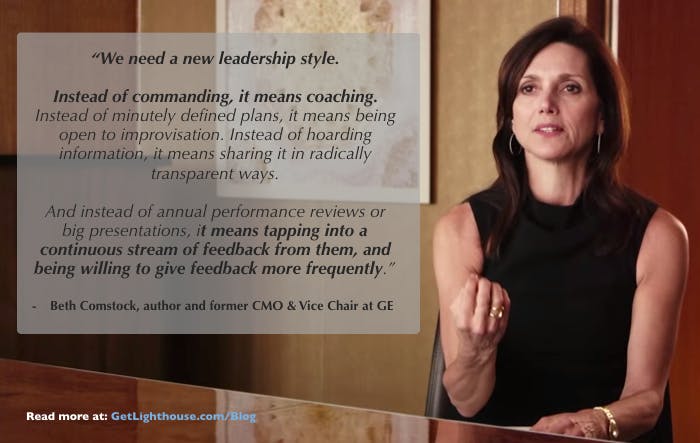
2) Weekly Feedback
Praise is a great habit to have, but it's not the only weekly habit you need. You also need to spend time coaching your team with feedback so they know how to improve.
Remember our point from the last section? No surprises at review time is part of the reason you need to give weekly feedback.
The other reason to give weekly feedback is that it helps you and your team perform better. Gartner research shows that employees who report to good coaches are up to 40% more focused.
If you need to work on your feedback habits and improve your coaching skills, start here:
- Learn 6 ways to give feedback that really work, and are better than that sh*t sandwich.
- For big issues, use our battle-proven 3 step process to give feedback that drives real improvement in your team
- If you want to go back to the basics, learn the Five Foundational Habits of Being a Great Coach here
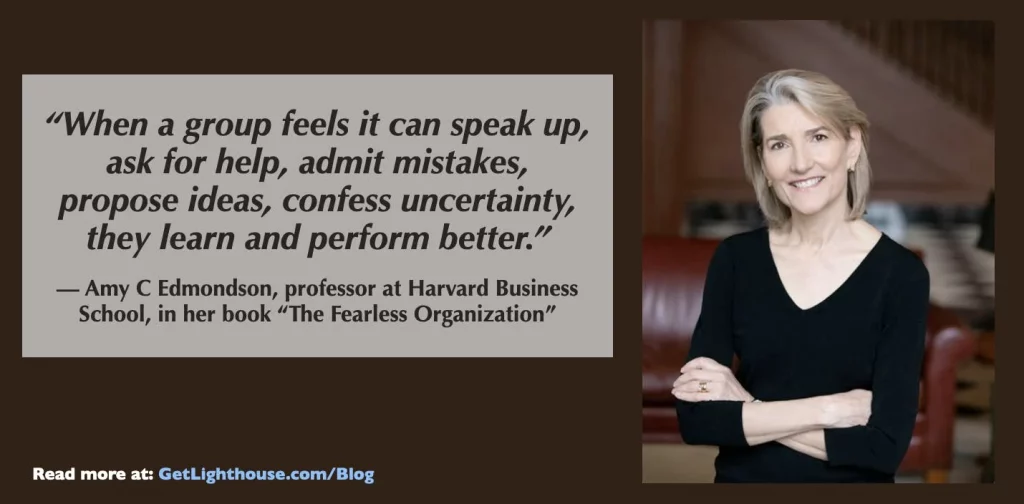
3) Building a Collaborative Team
The last major gap is one of the most underrated. When your team feels like open collaboration is really possible, you get the best ideas. It's something Steve Jobs fostered quite a bit at Apple with his Cauldrons, and it's something you can have, too when you create and maintain psychological safety.
And once again, Gallup comes to the rescue with the quantified value of this practice:
"Gallup finds that psychological safety can lead to a variety of benefits including: "27% reduction in turnover, a 40% reduction in safety incidents, and a 12% increase in productivity."
All because people feel comfortable raising issues and talking openly.
Yet, it appears that only 30% of teams feel they have that with their team. If you're not sure if your team is as collaborative as it could be, then it's time to brush up on how to do it:
- Learn everything you need to know about Psychological Safety and how to create it here.
- A key part of building a more collaborative team is how you are unknowingly affecting your team. Learn how you can raise your self-awareness here.
🤫 Get Ready to Learn the Secrets of Great Senior Leaders...
Thanks to all of you who took our survey last week. Based on poll results, we're making the classic program, The Secret Habits of Senior Leaders available for purchase for 1 week only starting next Wednesday, September 18th.
The program then starts the following Thursday, September 26th.
This is timed perfectly so that you'll get a break for Thanksgiving, and wrap up the 12 lesson program before the Christmas, Hanukkah, and holiday season hits in the latter half of December.
In this program, you'll learn key skills that will help you advance in your leadership career, whether you need to grow into managing other managers, or that's the next promotion you want from being a manager of individual contributors.
In the program, you'll learn essential skills including:
- Managing yourself & your mindset to better lead your team
- Timeless productivity tactics for you and your team to get more done
- Understanding the key difference maker for workplace happiness and retention
- How to find diamonds in the rough and hire better
- The keys to effectively handling disagreements at work
- How to teach your team to better manage up to you
And much more across this highly rated 12-lesson course.
Get ready! Start those discussions with your manager, check your remaining budget for the year, look up your learning allotment, or however, you'll be paying for the program, and get ready to sign up to join us.
As usual, the early birds 🐦 get the best price, so be ready to reserve your spot on Wednesday!
And remember that when you sign up for a group you can get a weekly discussion agenda to build bonds, deepen your understanding of each lesson, as well as support and coach your fellow managers. So start talking to your team of managers or peers about joining you, too.
📆 Mark your calendars and add this to your to do list now, and reply with any program questions now.
🗳️ Help Us Create the Lighthouse Leadership Community
In our last two surveys, we asked an important question:
"Do you want to join an online community of like-minded leaders learning and growing together?"
In both cases, what we heard is that a significant portion of you definitely want to, and the majority of you are curious and would want to join under the right conditions.
If we're going to launch a community, we want to do it right, which is why we want your input.
Everyone who takes this survey will be on the list for priority access when we launch the community, and of course, we'll be integrating your feedback from the survey into how and what we launch.
So if you're interested in joining an online community of like-minded leaders, secure your spot by taking our quick survey here.
❓ Poll of the week
Last week, we asked about your coaching habits:
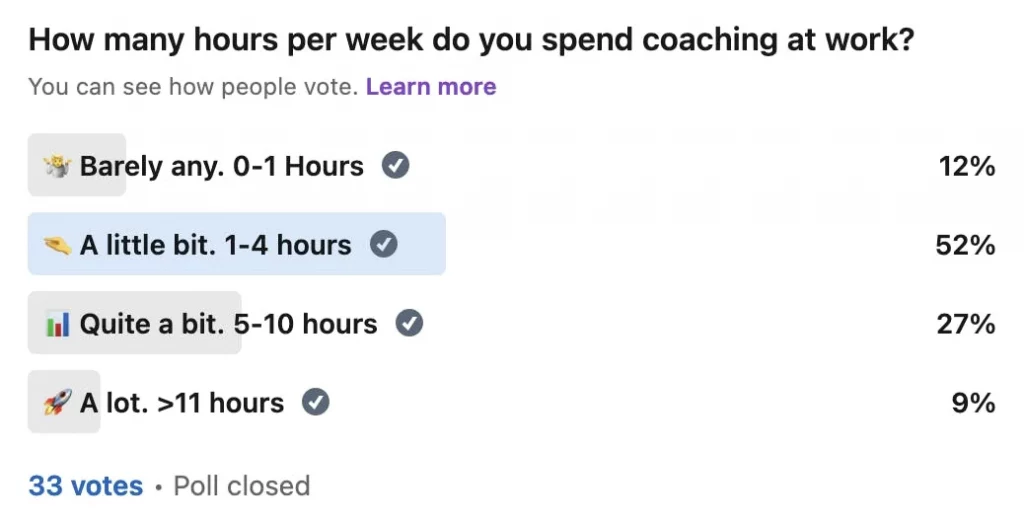
It's great to see most managers are at least putting in a little time every week. It's one of those habits that is super important especially long term, but can easily slip.
Remember: the performance of your team is your responsibility.
And just like you need to invest in improving your underperformers, or trying to change a jerk who is frustrating the rest of your team, you also need to set your stars up for success. In fact, the greatest gains can actually come from spending *more time* making your best people even better.
---
Now this week, we take a closer look at what you find hardest about coaching your team:
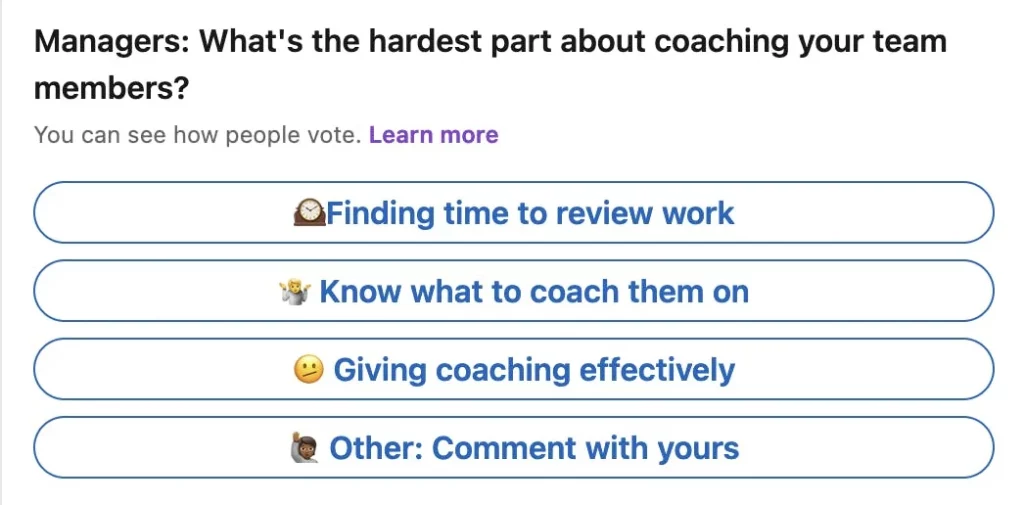
Let us know what you find as the hardest part about coaching and we'll dive into more detail in next week's newsletter to help you with the winning option. You can vote now here.
Sign up to get this newsletter & our latest blog posts straight to your inbox:




